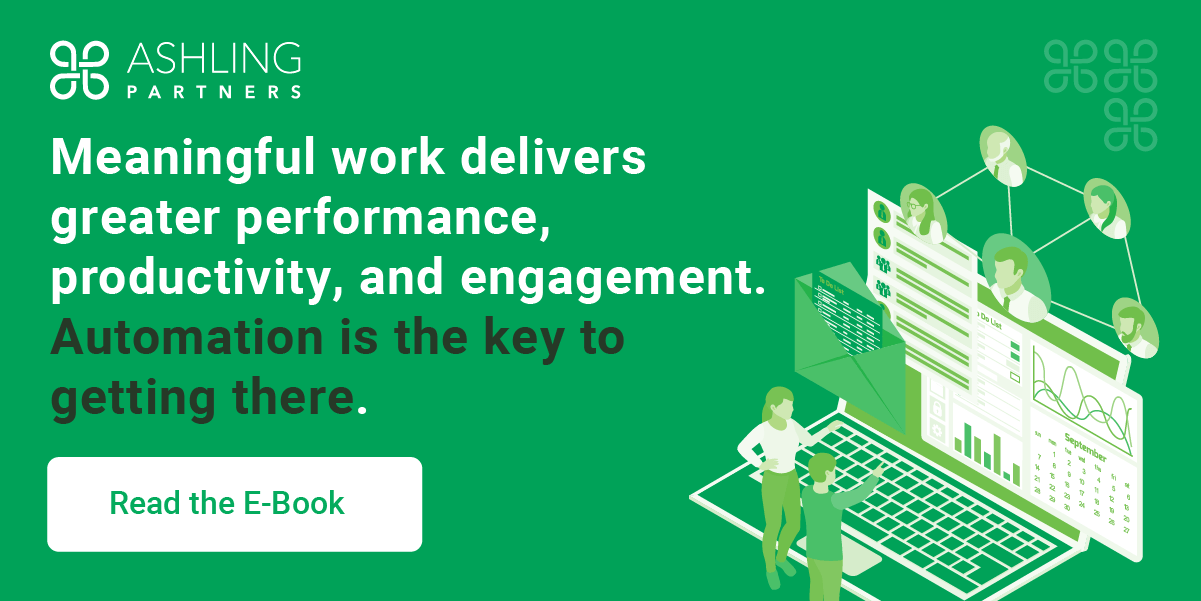As the world enters a new era of work after years of disruption and adjustments, one topic that many are paying more attention to than they did before is meaningful work. The concept of meaningful work primarily has to do with employee satisfaction and fulfillment, and businesses that take this need seriously stand to capture greater value with staff doing more than transactional inputs.
Implementing meaningful work into your business can create big wins for all parties, but most organizations still struggle with defining it and deploying it consistently across the enterprise. One of the key elements that can help them overcome barriers is automation.
In this post, we’ll look at what meaningful work is, why it matters, and how automation paves the way for its utilization.
What Is Meaningful Work?
Meaningful work is a broad term with many aspects. First and foremost, it’s the feeling that employees have when they are part of something larger than themselves. They are motivated and engaged because their work feels significant and fulfills them.
Second, from an organizational standpoint, meaningful work involves employees having the ability to be critical thinkers and innovators rather than repeatedly doing the same basic tasks by rote. Businesses want employees to do more than data entry, and most employees feel the same. If they are stuck in this mundane cycle of work, their disconnection only grows, which creates issues for companies. Those issues can include efficiency, productivity, and retention problems.
You can see how meaningful work can become a competitive advantage for companies. It drives a connection between employees and their work while also driving operational efficiency and eliminating a lot of wasteful practices.
These points are just the start when it comes to the importance of meaningful work. Let’s drill down into this point further.
Why Meaningful Work Matters
For businesses that pursue transformation through meaningful work, the benefits and advantages can be critical. They provide a sustainable path for growth that supports the company and its employees. The impactful changes meaningful work makes to your workflows and processes are measurable, and so is its effect on employees.
Here are some of the things your organization can realize by prioritizing meaningful work.
Finding meaning in work improves employees’ mental health.
Work isn’t everything, but it’s where we spend a lot of time. If it’s not a fulfilling or positive environment, mental health can suffer. Healthier employees are more engaged at work and typically have fewer absences than their depressed counterparts.
Greater retention is possible with meaningful work.
Retaining employees isn’t easy. When turnover rates are high, so are the costs to companies that need to fill those roles. If your staff is engaging in meaningful work, you are more likely to have the advantage of keeping them.
When workers feel attached, the tangible benefit for companies is 50 percent less turnover and a 56 percent increase in job performance. Retention is even more crucial in the candidate-driven job market, where talented people have more options.
More attractive work supports recruitment.
In addition to retention, attracting talent can be more successful when the work is meaningful. The job market is still seeing many openings and low unemployment. If the type of work you offer is meaningful and fulfilling instead of repetitive and unstimulating, your jobs look more enticing.
Younger generations have higher expectations of the nature of work because most are digital natives. They won’t be attracted to companies that are behind the curve.
Fulfilled employees deliver greater value for your internal and external customers.
Satisfied employees that feel connected to what they do perform better. They will look harder at challenges instead of ignoring them. They will feel empowered to innovate because they know their voice matters. When your company embeds meaningful work into its culture, more value is created for your employees every day.
As much as meaningful work can revolutionize the workplace, it also comes with many challenges.
The Challenges with Meaningful Work
Simply stating that your company will invest in and strategize around meaningful work is only the beginning. It’s not a one-size-fits-all implementation, so a host of issues can arise. The most common barriers to meaningful work include:
- Inconsistency: Meaningful work parameters and strategies must include the entire company, not just select departments or roles. If there is inconsistency, resentment can grow and become disastrous.
- Scaling difficulty: For large and mid-size companies, this can be a roadblock. Identifying the people, processes, and technology across the enterprise can be daunting. However, it’s worth doing this to ensure all areas of a company can leverage meaningful work.
- Lack of top-down support: Meaningful work and its implementation should begin with leadership. And it’s not enough to simply be on board; they must champion meaningful work for it to permeate through the organization.
- Not knowing where to start: Some companies may find the transition too overwhelming and not know how to begin the journey. Fear paralyzes them from adopting new avenues. Change management is a difficult task, and some legacy employees find comfort and security in repetitive work. Organizations will need to address these valuable team members proactively, so they can more easily embrace change.
All these challenges have one thing in common: They can be overcome with the power of automation.
Automation’s Role in Achieving Meaningful Work
Automation has a crucial role in an organization’s ability to achieve meaningful work. It removes mundane and tedious tasks from employees’ plates. Here are some key examples of how industries have implemented automation to drive toward meaningful work.
Healthcare
Enabling automation for clinicians in notating and updating electronic health records (EHRs) gives them more time to care for patients. They are no longer mired in administrative work, and they have a greater capacity to deliver the best care. With more time to actually help patients, they find greater fulfillment and could be less likely to suffer burnout. Deploying automation in these scenarios can also improve patient care and prevent medical mistakes.
Manufacturing
Manufacturing is another industry that can gain from introducing automation to drive meaningful work. Most in the sector have legacy systems and lots of data that require consolidation. If this necessary data consolidation requires manual tasks, there’s a lot of labor with little fulfillment.
By incorporating automation, digital robots via robotic process automation (RPA) can do this work. Then employees can focus more on analyzing data to pinpoint roadblocks to efficiency. In this turn of events, workers are able to use critical thinking skills.
Energy
The energy sector can also leverage automation to create more meaningful work. For example, in the renewable energy vertical, using intelligent automation to understand asset performance and monitor those assets for maintenance and outages is a powerful tool for employees. They can move from being in the mode of always “putting out fires” to being able to forecast production.
Customer Service and Support
Automation can be the perfect solution for creating more meaningful work in contact centers. It improves how they work and can eliminate a lot of the administrative things they have to do.
When these burdens are off their plates, they can focus more on resolving customer issues. Automation can integrate the multiple systems they use to ensure they have the correct information to support the customer. Most agents are in the job to help others, not manage systems or do data entry.
Automation and Meaningful Work Are a Great Team
Automation and meaningful work are uniquely linked. When these two elements are working in tandem, businesses and their employees can reap the benefits. Learn more about this deep connection and why it matters by scheduling a consultation.



